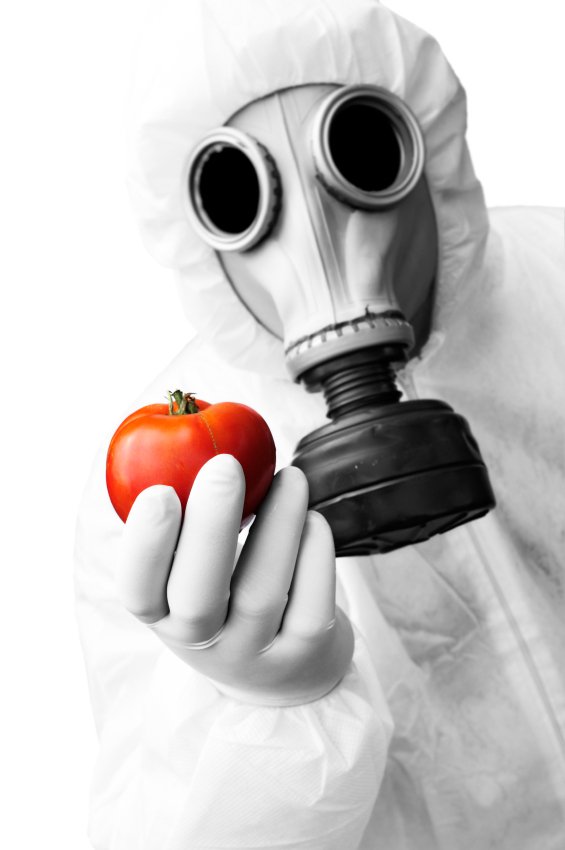7 foods so unsafe farmers won’t eat them

Smoking was proven to be cancer-causing, tanning beds were shown to be on par with arsenic, but what about canned tomatoes, corn-fed beef, conventionally grown potatoes? What would it take to convince you to clean out your pantry and change your eating habits? Scientists, doctors, even farmers were asked what foods they refuse to eat. The responses had nothing to do with things like donuts due to fat content, or white bread because of the concentration of empty carbs. We’re talking seemingly healthy things like tomatoes, beef, popcorn, potatoes, salmon, milk, and apples. For them, it’s all about how they are produced and packaged.
Seven experts in fields pertaining to both food and the environment answered one simple question: “What foods do you avoid?” Their answers, published in an article entitled “7 Foods the Experts Won’t Eat” on Yahoo! Shine, will make you re-think food. When it comes to food and its affect on your health and the health of this planet, this is what they answered:
1. CANNED TOMATOES
The Expert: Fredrick vom Saal, PhD, an endocrinologist at the University of Missouri who studies bisphenol-A.
The Reason: Tin cans are lined with a resin that contains the synthetic estrogen bisphenol-A, which has been linked to a slew of health problems including heart disease, diabetes, reproductive problems, and obesity. But that’s not the biggest problem. The acid in tomatoes breaks down that bisphenol-A, leaching it into the food, and not just in insignificant amounts. According to the article, Saal comments that “you can get 50 mcg of BCA per liter out of a tomato can, and that’s a level that is going to impact people, particularly the young.” That’s why he’s not touching the stuff.
The Solution: If you love the taste of “canned” tomatoes but prefer to skip the bisphenol-A, select glass bottles instead.
2. CORN-FED BEEF
The Expert: Joel Salatin, co-owner of Polyface Farms and author of half a dozen books on sustainable farming.
The Reason: Cattle are naturally grass eaters… not grain eaters. In order to fatten the animals (and profit margins), farmers feed them corn and soybeans. And while the farmers are beefing up their earnings, they are minimizing the nutritional benefits. The article mentions the findings from a recent USDA-conducted study comparing corn-fed beef and grass-fed beef showing that grass-fed beef is “higher in beta-carotene, vitamin E, omega-3s, conjugated linoleic acid (CLA), calcium, magnesium, and potassium; lower in inflammatory omega-6s; and lower in saturated fats that have been linked to heart disease.
The Solution: Pretty straight forward: Opt for grass-fed beef instead.
3. MICROWAVE POPCORN
The Expert: Olga Naidenko, PhD, a senior scientist for the Environmental Working Group.
The Reason: It’s not the popcorn itself, but the chemically-saturated lining of the bag including a compound called perfluorooctanoic acid (PFOA) that, according to a recent study from UCLA, may be linked to infertility. Microwaving vaporizes the chemicals as they move from coating the bag to lining the popcorn. But it’s not like this fact is un-acknowledged. In fact the article points out that DuPont, as well as other manufacturers, have “promised to phase out PFOA by 2015 under a voluntary EPA plan, but millions of bags of popcorn will be sold between now and then.”
The Solution: Pop your own popcorn the way they did it in the olden days–in a pot.
4. CONVENTIONALLY GROWN (NOT ORGANIC) POTATOES
The Expert: Jeffrey Moyer, chair of the National Organic Standards Board.
The Reason: Herbicides and pesticides may not be sprayed directly on root vegetables (since they’re underground), but they absorb the chemicals through the soil and water. Because potatoes are considered the nation’s most popular vegetable, producing a healthy crop is essential to keep up with demand. In order to maintain their health, the article exposes the scary fact that “they’re treated with fungicides during the growing season, then sprayed with herbicides to kill off the fibrous vines before harvesting. After they’re dug up, the potatoes are treated yet again to prevent them from sprouting.” But here’s the scary thing, Moyer says that he’s talked to potato growers “who say point-blank they would never eat the potatoes they sell. They have separate plots where they grow potatoes for themselves without all the chemicals.”
The Solution: Another no-brainer— Only buy organic potatoes.
5. FARMED SALMON
The Expert: David Carpenter, MD, director of the Institute for Health and the Environment at the University at Albany and publisher of a major study in the journal Science on contamination in fish.
The Reason: When salmon is crammed into pens, fed soy, poultry litter, and hydrolyzed chicken feathers (obviously an unnatural environment for the up-stream swimmers), they’re levels of healthy vitamin D lowers as the contaminants increases. Those contaminants include carcinogens, PCBs, brominated flame retardants, and pesticides (like DDT). The article points out that DDT has been linked to both diabetes and obesity, quoting Carpenter in saying that “You can only safely eat one of these salmon dinners every 5 months without increasing your risk of cancer… It’s that bad.”
The Solution: Avoid farmed salmon and instead select wild-caught Alaskan salmon. But make sure the packaging reads “wild.” If it just says “fresh Atlantic,” according to the article, “it’s farmed.”
6. MILK PRODUCED WITH ARTIFICIAL HORMONES
The Expert: Rick North, project director of the Campaign for Safe Food at the Oregon Physicians for Social Responsibility and former CEO of the Oregon division of the American Cancer Society.
The Reason: Unlike in the olden days when fresh milk was some of the purest nutrients you could get, dairy cows today are fed growth hormones like rBGH and rBST to increase milk production. Problem is, while they may be making more milk, they are also increasing their chances of udder infections (which can lead to pus in the milk). More than that, the article points out that high levels of IGF-1 from the rBGH may play a role in the development of breast, prostate, and colon cancers… which is why North says that “it’s banned in most industrialized countries.”
The Solution: Read the labels and be sure that your milk doesn’t contain rBGH or rBST and that it is labeled organic or “produced without artificial hormones.“
7. CONVENTIONAL APPLES
The Expert: Mark Kastel, former executive for agribusiness and co-director of the Cornucopia Institute, a farm-policy research group that supports organic foods
The Reason: Apples are the recipient of the most pesticides of all Fall fruits. Chemical producers swear that the residue is not harmful for human consumption, but the Yahoo! Article goes on to quote Kastel in saying that “Farm workers have higher rates of many cancers.”
The Solution: Buy organic apples where available or at least thoroughly wash and peel apples before eating them.
Source: http://foodfreedom.wordpress.com/2010/06/11/7-foods-so-unsafe-even-farmers-wont-eat-them/






